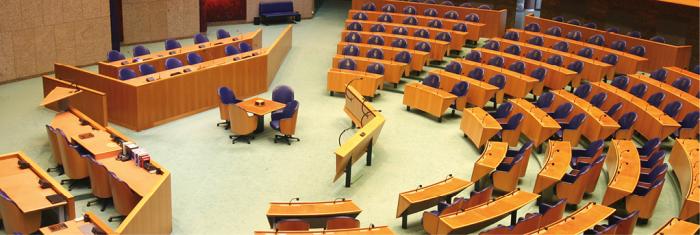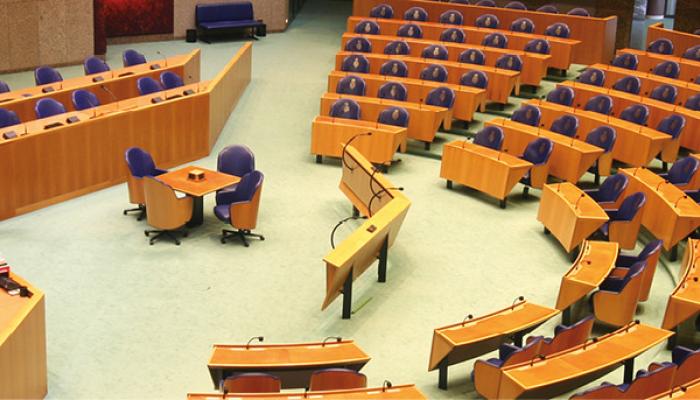
4.48 Po politikat, ekonomia dhe mjedisi?
Shoqëria jonë përbëhet nga njerëz me prejardhje dhe besime të ndryshme, të cilët përpiqen të jetojnë së bashku në paqe. Është një detyrë e rëndësishme e të krishterëve pjesëmarrja në jetën shoqërore dhe politika luan një rol qendror në jetën shoqërore. Gjithashtu, në politikë, Ungjilli [> 4.50] dhe mësimi i Kishës [> 4.45] duhet të shërbejnë si pikënisje.
Kjo do të thotë, për shembull, që aktiviteti ekonomik duhet t'u shërbejë interesave të të gjithë anëtarëve të shoqërisë, qofshin të pasur apo të varfër. Ne jemi përgjegjës për menaxhimin e duhur të tokës dhe burimeve të saj natyrore. Është e rëndësishme të respektohet krijimi i Zotit [> 1.3].
Si marrin pjesë të krishterët në jetën politico- shoqërore?
Besimtarët laikë ndërhyjnë drejtpërdrejtë në jetën politiko-shoqërore duke gjallëruar, sipas frymëzimit të krishterë, realitetet e botës ku jetojmë dhe duke bashkëpunuar me të gjithë, si dëshmitarë të vërtetë të Ungjillit dhe njerëz që punojnë për paqen dhe drejtësinë. [KKKP 519]
Are Christians obliged to become involved in politics and society?
It is a special duty of the Christian laity people to become involved in politics, society, and commerce in the spirit of the Gospel: in charity, truth, and justice. Catholic social teaching offers them clear guidance in this endeavor.
Partisan political activity is, however, incompatible with the ministry of bishops, priests, and religious, who must be of service to everyone. [Youcat 440]
Si duhet ushtruar jeta shoqërore dhe ekonomike?
Ajo ushtrohet sipas metodave të veta, brenda cakut të rregullit moral, në shërbim të njeriut në integritetin e tij dhe të mbarë bashkësisë njerëzore, si edhe në respektimin e drejtësisë shoqërore. Kjo jetë duhet ta ketë njeriun si autor, qendër dhe qëllim të vetin. [KKKP 511]
What is the Church’s stance on capitalism or the free-market economy?
Any form of capitalism that is not embedded in an established system of law runs the risk of detaching itself from the common good and becoming a mere means for individuals to make profits. The Church rejects that decisively. On the other hand, she supports a free-market system which is at the service of man, prevents monopolies, and ensures that all are supplied with employment and vitally necessary goods.
Catholic social teaching evaluates all societal arrangements according to whether they serve the common good (common good), which means: to the extent that they enable “men, families, and associations more adequately and readily [to] attain their own perfection” (Second Vatican Council, GS). This is also true of commerce, which in the first place should be at the service of man. [Youcat 442]
What does the Church say about globalization?
Globalization is in itself neither good nor bad; it is, rather, the description of a reality that must be shaped. “Originating within economically developed countries, this process by its nature has spread to include all economies. It has been the principal driving force behind the emergence from underdevelopment of whole regions, and in itself it represents a great opportunity. Nevertheless, without the guidance of charity in truth, this global force could cause unprecedented damage and create new divisions within the human family” (Pope Benedict XVI, CiV).
When we buy inexpensive jeans, we should not be indifferent to the conditions in which they were manufactured, to the question of whether or not the workers received a just wage. Everyone’s fortune matters. No one’s poverty should leave us indifferent. On the political level, there is a need for “a true world political authority” (Pope Benedict XVI, CiV [citing Bl. John XXIII, Encyclical Pacem in terris]) to help reach a compromise between the people in the rich nations and those in underdeveloped countries. Far too often the latter are still excluded from the advantages of economic globalization and have only burdens to bear. [Youcat 446]
Çfarë urdhëron Urdhërimi i shtatë?
Urdhërimi i shtatë urdhëron respektimin e të mirave të të tjerëve, nëpërmjet ushtrimit të drejtësisë dhe të bamirësisë, të vetëpërmbajtjes dhe të solidaritetit. Në veçanti, ai urdhëron mbajtjen e premtimeve të dhëna dhe të kontratave të nënshkruara; ndreqjen e padrejtësive të kryera dhe kthimin e sendeve të vjedhura; respektimin e integritetit të krijimit përmes përdorimit të kujdesshëm dhe të matur të rezervave minerare, bimore e shtazore që gjenden në tokë, duke pasur kujdes të veçantë ndaj llojeve të kërcënuara nga zhdukja. [KKKP 506]
Si duhet të sillet njeriu me kafshët?
Njeriu duhet t’i shohë kafshët, krijesa të Hyjit, me dashamirësi, duke shmangur si teprimet në dashuri ndaj tyre, ashtu edhe përdorimin e tyre të pakujdesshëm, sidomos për qëllime eksperimentesh shkencore të kryera jashtë caqeve të arsyes dhe duke i shkaktuar dhimbje të panevojshme vetë kafshëve. [KKKP 507]
Çfarë ndalon Urdhërimi i shtatë?
Urdhërimi i shtatë ndalon mbi të gjitha vjedhjen, që është përvetësimi i të mirave të tjetrit kundër vullnesës së arsyeshme të pronarit. Kjo përfshin pagimin e rrogave të pamjaftueshme; mashtrimin mbi vlerën e të mirave për të nxjerrë përfitim mbi kurrizin e të tjerëve dhe falsifikimin e çeqeve bankare ose të faturave. Gjithashtu ky urdhërim ndalon, ndër të tjera, kryerjen e mashtrimeve fiskale ose tregtare dhe shkaktimin e vullnetshëm të një dëmi ndaj pronave private apo publike. Ky urdhër ndalon edhe fajdet, rryshfetet, shpërdorimin privat të të mirave shoqërore, punët që kryhen keq me dashje dhe shkapërderdhjen. [KKKP 508]
How should we treat the environment?
We fulfill God’s commission with regard to creation when we care for the earth, with its biological laws, its variety of species, its natural beauty, and its dwindling resources, as a living space and preserve it, so that future generations also can live well on earth.
In the Book of Genesis, God says, “Be fruitful and multiply, and fill the earth and subdue it; and have dominion over the fish of the sea and over the birds of the air and over every living thing that moves upon the earth” (Gen 1:28). Having “dominion over the earth” does not mean having an absolute right to dispose arbitrarily of animate and inanimate nature, animals, and plants. Because man is created in God’s image, he should care for God’s creation as a shepherd and steward. For the first book of the Bible also says, “The Lord God took the man and put him in the garden of Eden to till it and keep it” (Gen 2:15). [Youcat 436]
How should we treat animals?
Animals are our fellow creatures, which we should care for and in which we should delight, just as God delights in their existence.
Animals, too, are sentient creatures of God. It is a sin to torture them, to allow them to suffer, or to kill them uselessly. Nevertheless, man may not place love of animals above love of man. [Youcat 437]
Shqetësimi i parë i "Lutjes së Zotit" është që emri i Hyjit të lavdërohet, që Mbretëria e tij të vijë, që vullneti i tij të bëhet. Nëse kjo është përparësia jonë, atëherë gjithçka tjetër do të na jepet përveç kësaj. Përparimi në shkencë, ekonomi, organizim shoqëror dhe kulturë nuk do të na heqë njerëzimin tonë, por do të pasqyrojë dashurinë që vetëm i jep jetë, kuptim dhe gëzim përpjekjeve tona njerëzore. [Papa Gjon Pali II, Homeli në Tromsø, 2 qershor 1989]





